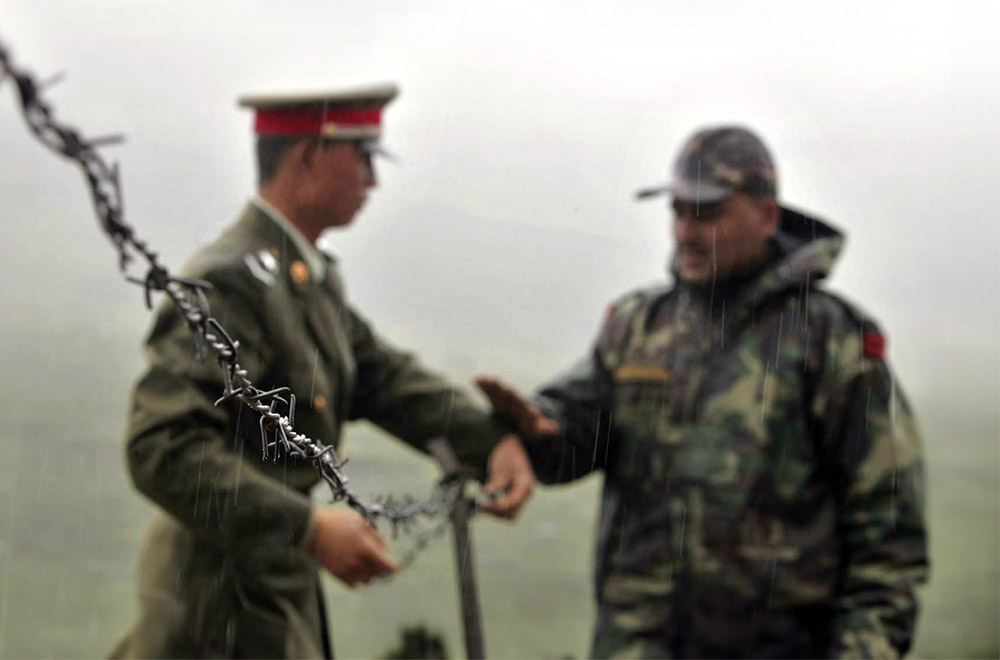(TibetanReview.net, Sep06’25) – India’s biggest security challenge is the unresolved Tibet-boundary dispute with China while the next one is Pakistan’s proxy war via cross-border terrorism, India’s top military officer has said Sep 5 while speaking at a symposium.
“I consider the unresolved border dispute with China as the biggest challenge. The second major challenge is the proxy war being run by Pakistan against India,” the PTI news agency Sep 6 quoted Gen Anil Chauhan, India’s Chief of Defence Staff, as saying.
Speaking as the chief guest at a symposium on “National Security Challenges Before India” held at the Gorakhnath temple in the state of Uttar Pradesh, Gen Chauhan emphasised that border disputes have historically been at the core of India’s wars and continue to pose formidable security threats, according to hindustantimes.com Sep 5.
“I consider the unresolved border dispute with China as the biggest challenge. The second major challenge is the proxy war being run by Pakistan against India. Pakistan’s strategy has been to ‘bleed India by a thousand cuts. It means keep hurting India slowly at a regular interval,” it quoted Gen Chauhan as saying.
He has also spoken of threats from regional instability, fast-changing warfare technology, and the risk of fighting two nuclear-armed adversaries as other challenges.
Gen Chauhan has joined Uttar Pradesh Chief Minister Yogi Adityanath to lay the foundation stone for the renovation of the Gorkha War Memorial and the Gorkha Museum. He has also offered prayers at the Gorakhnath temple.
Meanwhile, India’s Ministry of External Affairs (MEA) on said Sep 5 denied a report that said the thaw in the relations between India and China happened after Beijing sent a ‘secret letter’ to New Delhi.
MEA spokesperson Randhir Jaiswal categorically denied the existence of any such letter, saying that the story running in the media was ‘incorrect’, reported hindustantimes.com Sep 6.
Jaiswal was referring to a Bloomberg report which said Chinese President Xi Jinping had sent a ‘secret letter’ to India’s President Droupadi Murmu, which it claimed kicked off the push to improve ties between New Delhi and Beijing. The report said Beijing saw the improvement of the relationship with India as a ‘safeguard’ against US President Donald Trump and his tariff policies.
The letter was claimed to have encouraged Prime Minister Narendra Modi to undertake his first visit to Beijing in seven years after the Galwan Valley border clash of the troops from the two sides. Modi not only took part in the 25th meeting of the Heads of State of the Shanghai Cooperation Council (SCO) in the coastal city of Tianjin but also discussed a wide range of crucial topics, including the border issue, with President Xi on Aug 31.
In a press release on the meeting, the MEA said Nodi and Xi reaffirmed that the two countries were development partners and not rivals, and that their differences should not turn into disputes. Modi also invited Xi to the BRICS Summit that India will be hosting in 2026.
But the difference over the Tibet-border issue emerged even then. Xi said the two sides should “not let the border issue define the overall China-India relationship,”
But India would have none of it. Responding to the Chinese readout of Xi’s remarks on the meeting, India’s foreign secretary Vikram Misri said Modi had made it very clear that the boundary situation will have an impact on bilateral relations, reported the timesofindia.com Sep 1.
“From the very beginning, we have maintained, and at various levels we have made it clear, that the situation on the boundary will inevitably have some impact on bilateral relations. And that is precisely why the most important kind of ‘insurance policy’ for our bilateral ties is to maintain peace and tranquillity on the boundary. So today, the Prime Minister himself also conveyed this very clearly to President Xi, and we will continue to maintain this position,” theprint.in Sep 1 quoted Misri as saying at a special briefing on Modi’s visit to China.
India’s stand reflects its complete loss of trust in Beijing which has repeatedly violated signed series of agreements on the disputed Tibet-border issue.
